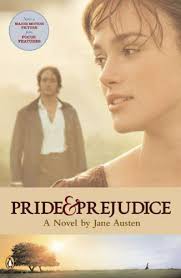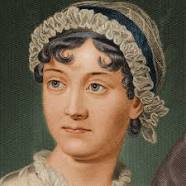Pride and Prejudice Page #10
Pride and Prejudice is a romantic novel by Jane Austen, first published in 1813. The story charts the emotional development of the protagonist, Elizabeth Bennet, who learns the error of making hasty judgments and comes to appreciate the difference between the superficial and the essential. The comedy of the writing lies in the depiction of manners, education, marriage, and money during the British Regency period.
“Elizabeth Bennet,” said Miss Bingley, when the door was closed on her, “is one of those young ladies who seek to recommend themselves to the other sex by undervaluing their own; and with many men, I dare say, it succeeds. But, in my opinion, it is a paltry device, a very mean art.” “Undoubtedly,” replied Darcy, to whom this remark was chiefly addressed, “there is a meanness in all the arts which ladies sometimes condescend to employ for captivation. Whatever bears affinity to cunning is despicable.” Miss Bingley was not so entirely satisfied with this reply as to continue the subject. Elizabeth joined them again only to say that her sister was worse, and that she could not leave her. Bingley urged Mr. Jones being sent for immediately; while his sisters, convinced that no country advice could be of any service, recommended an express to town for one of the most eminent physicians. This she would not hear of; but she was not so unwilling to comply with their brother's proposal; and it was settled that Mr. Jones should be sent for early in the morning, if Miss Bennet were not decidedly better. Bingley was quite uncomfortable; his sisters declared that they were miserable. They solaced their wretchedness, however, by duets after supper, while he could find no better relief to his feelings than by giving his housekeeper directions that every attention might be paid to the sick lady and her sister. Chapter 9 Elizabeth passed the chief of the night in her sister's room, and in the morning had the pleasure of being able to send a tolerable answer to the inquiries which she very early received from Mr. Bingley by a housemaid, and some time afterwards from the two elegant ladies who waited on his sisters. In spite of this amendment, however, she requested to have a note sent to Longbourn, desiring her mother to visit Jane, and form her own judgement of her situation. The note was immediately dispatched, and its contents as quickly complied with. Mrs. Bennet, accompanied by her two youngest girls, reached Netherfield soon after the family breakfast. Had she found Jane in any apparent danger, Mrs. Bennet would have been very miserable; but being satisfied on seeing her that her illness was not alarming, she had no wish of her recovering immediately, as her restoration to health would probably remove her from Netherfield. She would not listen, therefore, to her daughter's proposal of being carried home; neither did the apothecary, who arrived about the same time, think it at all advisable. After sitting a little while with Jane, on Miss Bingley's appearance and invitation, the mother and three daughters all attended her into the breakfast parlour. Bingley met them with hopes that Mrs. Bennet had not found Miss Bennet worse than she expected. “Indeed I have, sir,” was her answer. “She is a great deal too ill to be moved. Mr. Jones says we must not think of moving her. We must trespass a little longer on your kindness.” “Removed!” cried Bingley. “It must not be thought of. My sister, I am sure, will not hear of her removal.” “You may depend upon it, Madam,” said Miss Bingley, with cold civility, “that Miss Bennet will receive every possible attention while she remains with us.” Mrs. Bennet was profuse in her acknowledgments. “I am sure,” she added, “if it was not for such good friends I do not know what would become of her, for she is very ill indeed, and suffers a vast deal, though with the greatest patience in the world, which is always the way with her, for she has, without exception, the sweetest temper I have ever met with. I often tell my other girls they are nothing to her. You have a sweet room here, Mr. Bingley, and a charming prospect over the gravel walk. I do not know a place in the country that is equal to Netherfield. You will not think of quitting it in a hurry, I hope, though you have but a short lease.” “Whatever I do is done in a hurry,” replied he; “and therefore if I should resolve to quit Netherfield, I should probably be off in five minutes. At present, however, I consider myself as quite fixed here.” “That is exactly what I should have supposed of you,” said Elizabeth. “You begin to comprehend me, do you?” cried he, turning towards her. “Oh! yes--I understand you perfectly.” “I wish I might take this for a compliment; but to be so easily seen through I am afraid is pitiful.” “That is as it happens. It does not follow that a deep, intricate character is more or less estimable than such a one as yours.” “Lizzy,” cried her mother, “remember where you are, and do not run on in the wild manner that you are suffered to do at home.” “I did not know before,” continued Bingley immediately, “that you were a studier of character. It must be an amusing study.” “Yes, but intricate characters are the most amusing. They have at least that advantage.” “The country,” said Darcy, “can in general supply but a few subjects for such a study. In a country neighbourhood you move in a very confined and unvarying society.” “But people themselves alter so much, that there is something new to be observed in them for ever.” “Yes, indeed,” cried Mrs. Bennet, offended by his manner of mentioning a country neighbourhood. “I assure you there is quite as much of that going on in the country as in town.” Everybody was surprised, and Darcy, after looking at her for a moment, turned silently away. Mrs. Bennet, who fancied she had gained a complete victory over him, continued her triumph. “I cannot see that London has any great advantage over the country, for my part, except the shops and public places. The country is a vast deal pleasanter, is it not, Mr. Bingley?” “When I am in the country,” he replied, “I never wish to leave it; and when I am in town it is pretty much the same. They have each their advantages, and I can be equally happy in either.” “Aye--that is because you have the right disposition. But that gentleman,” looking at Darcy, “seemed to think the country was nothing at all.” “Indeed, Mamma, you are mistaken,” said Elizabeth, blushing for her mother. “You quite mistook Mr. Darcy. He only meant that there was not such a variety of people to be met with in the country as in the town, which you must acknowledge to be true.” “Certainly, my dear, nobody said there were; but as to not meeting with many people in this neighbourhood, I believe there are few neighbourhoods larger. I know we dine with four-and-twenty families.” Nothing but concern for Elizabeth could enable Bingley to keep his countenance. His sister was less delicate, and directed her eyes towards Mr. Darcy with a very expressive smile. Elizabeth, for the sake of saying something that might turn her mother's thoughts, now asked her if Charlotte Lucas had been at Longbourn since her coming away.
Translation
Translate and read this book in other languages:
Select another language:
- - Select -
- 简体中文 (Chinese - Simplified)
- 繁體中文 (Chinese - Traditional)
- Español (Spanish)
- Esperanto (Esperanto)
- 日本語 (Japanese)
- Português (Portuguese)
- Deutsch (German)
- العربية (Arabic)
- Français (French)
- Русский (Russian)
- ಕನ್ನಡ (Kannada)
- 한국어 (Korean)
- עברית (Hebrew)
- Gaeilge (Irish)
- Українська (Ukrainian)
- اردو (Urdu)
- Magyar (Hungarian)
- मानक हिन्दी (Hindi)
- Indonesia (Indonesian)
- Italiano (Italian)
- தமிழ் (Tamil)
- Türkçe (Turkish)
- తెలుగు (Telugu)
- ภาษาไทย (Thai)
- Tiếng Việt (Vietnamese)
- Čeština (Czech)
- Polski (Polish)
- Bahasa Indonesia (Indonesian)
- Românește (Romanian)
- Nederlands (Dutch)
- Ελληνικά (Greek)
- Latinum (Latin)
- Svenska (Swedish)
- Dansk (Danish)
- Suomi (Finnish)
- فارسی (Persian)
- ייִדיש (Yiddish)
- հայերեն (Armenian)
- Norsk (Norwegian)
- English (English)
Citation
Use the citation below to add this book to your bibliography:
Style:MLAChicagoAPA
"Pride and Prejudice Books." Literature.com. STANDS4 LLC, 2025. Web. 9 Jan. 2025. <https://www.literature.com/book/pride_and_prejudice_9>.




Discuss this Pride and Prejudice book with the community:
Report Comment
We're doing our best to make sure our content is useful, accurate and safe.
If by any chance you spot an inappropriate comment while navigating through our website please use this form to let us know, and we'll take care of it shortly.
Attachment
You need to be logged in to favorite.
Log In